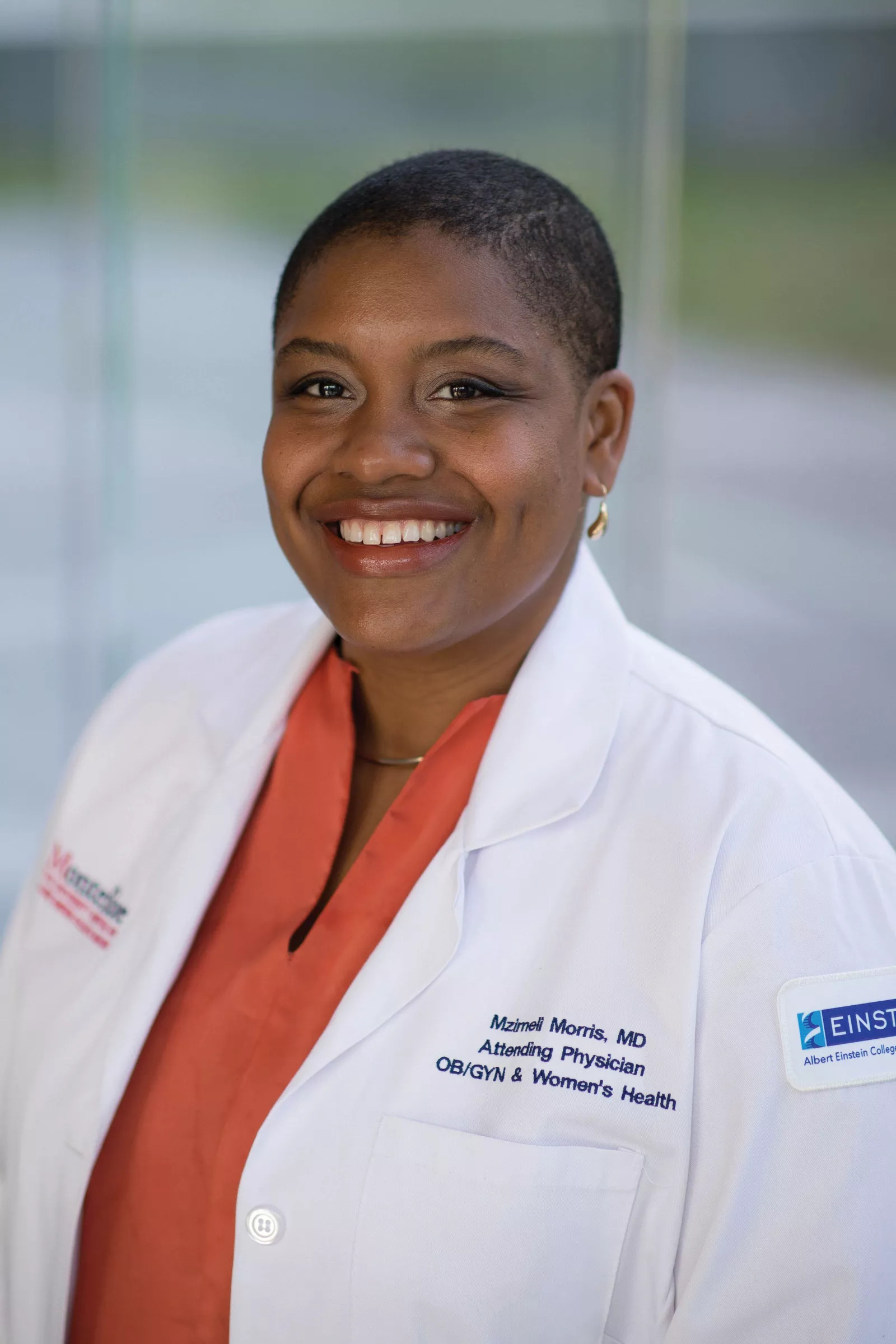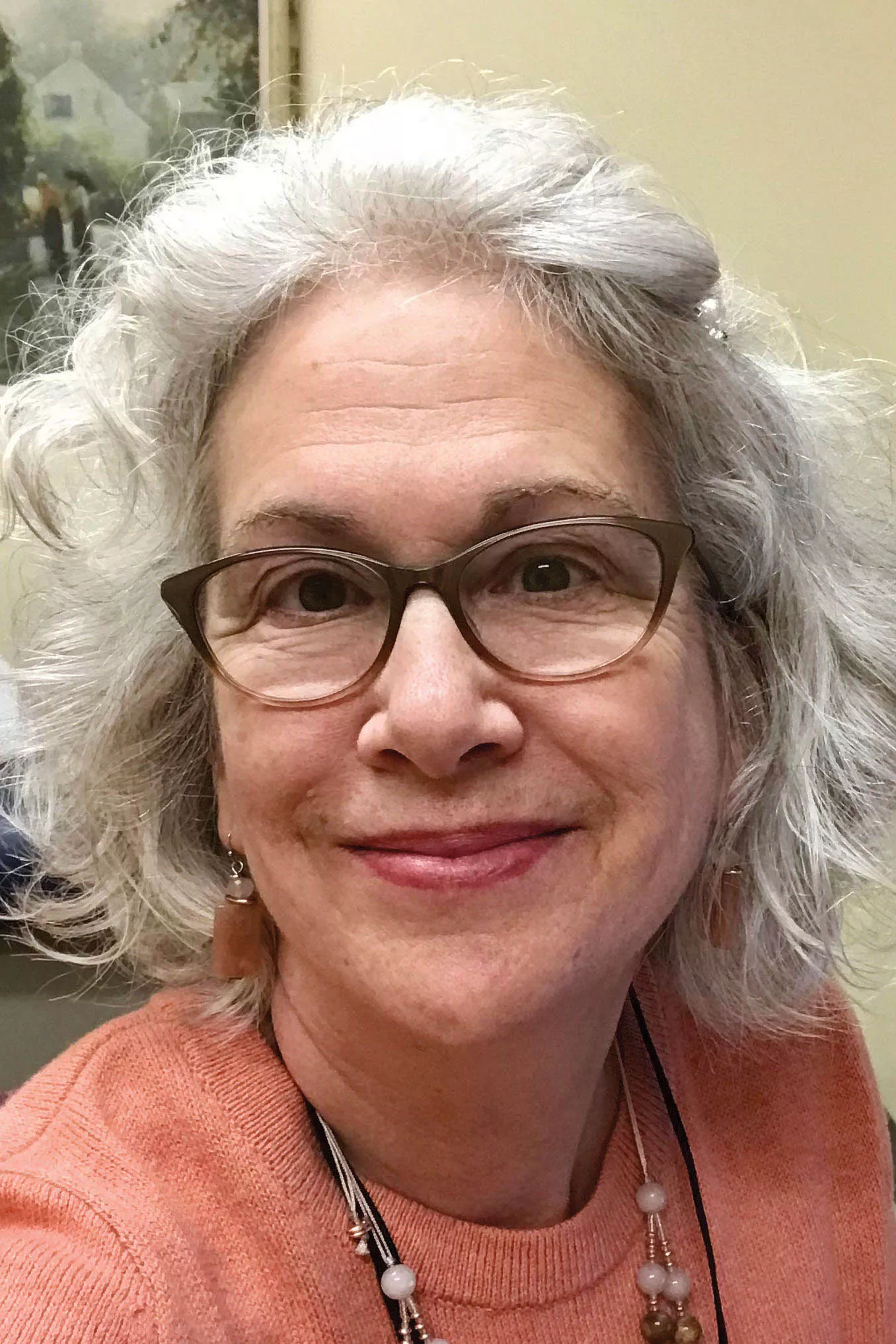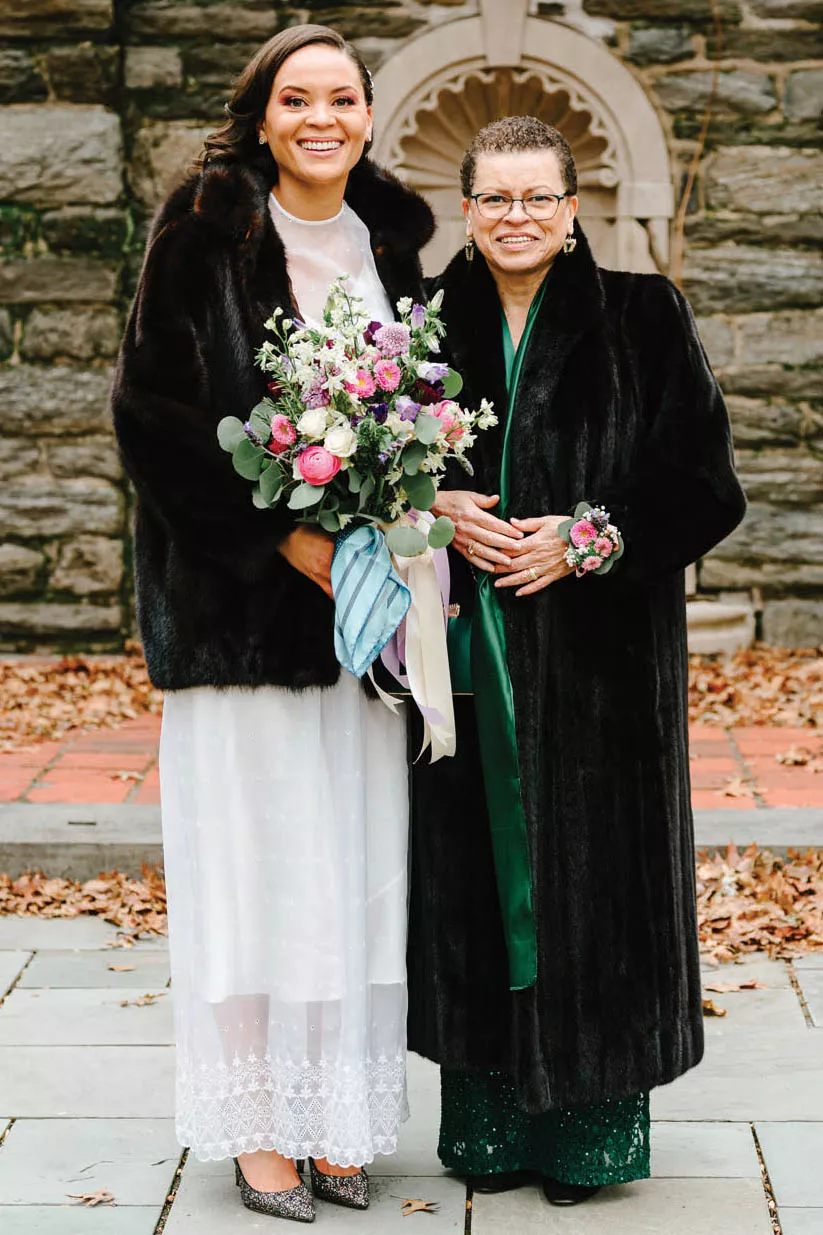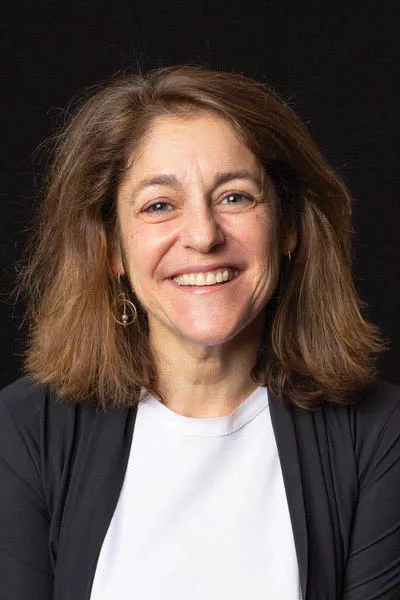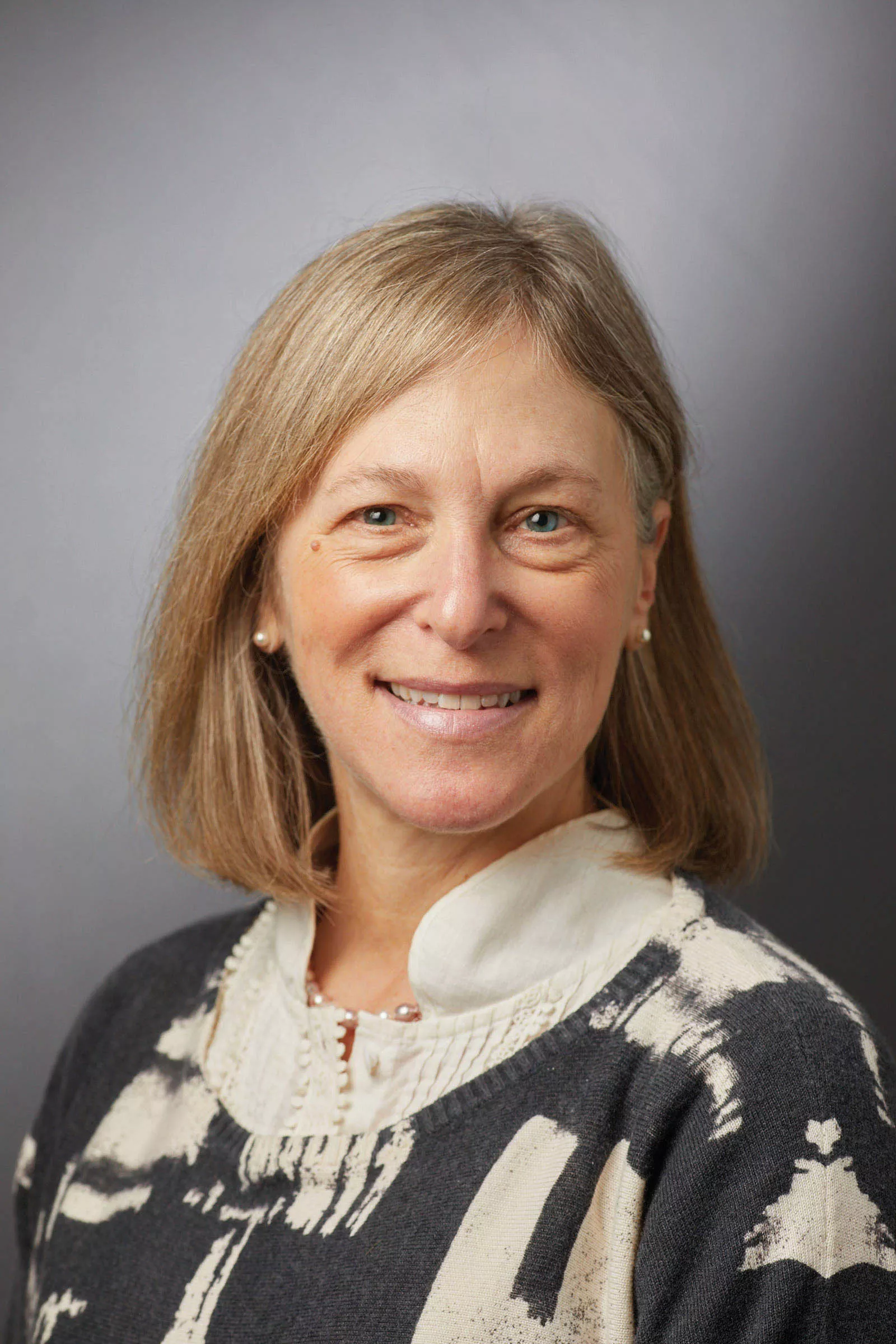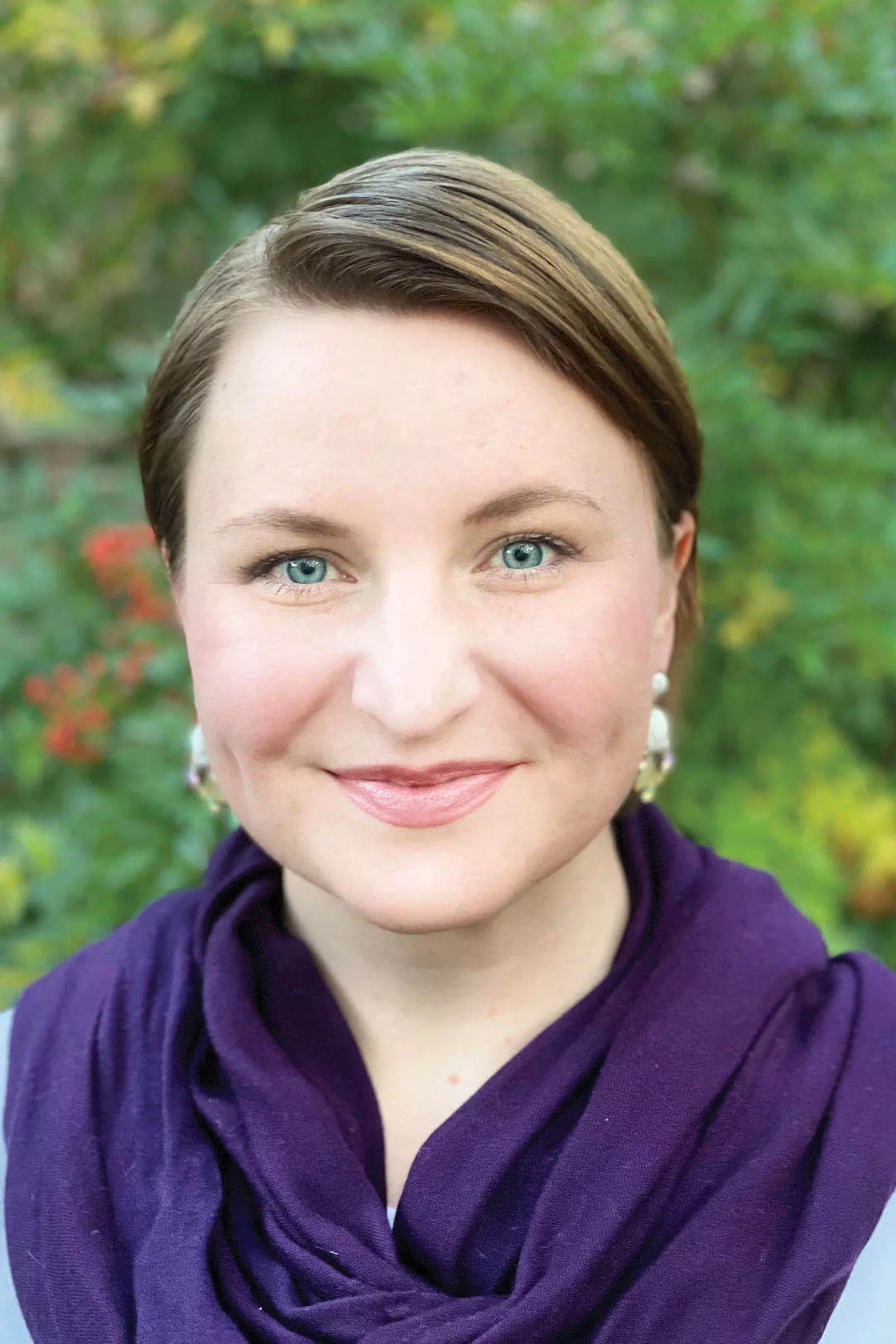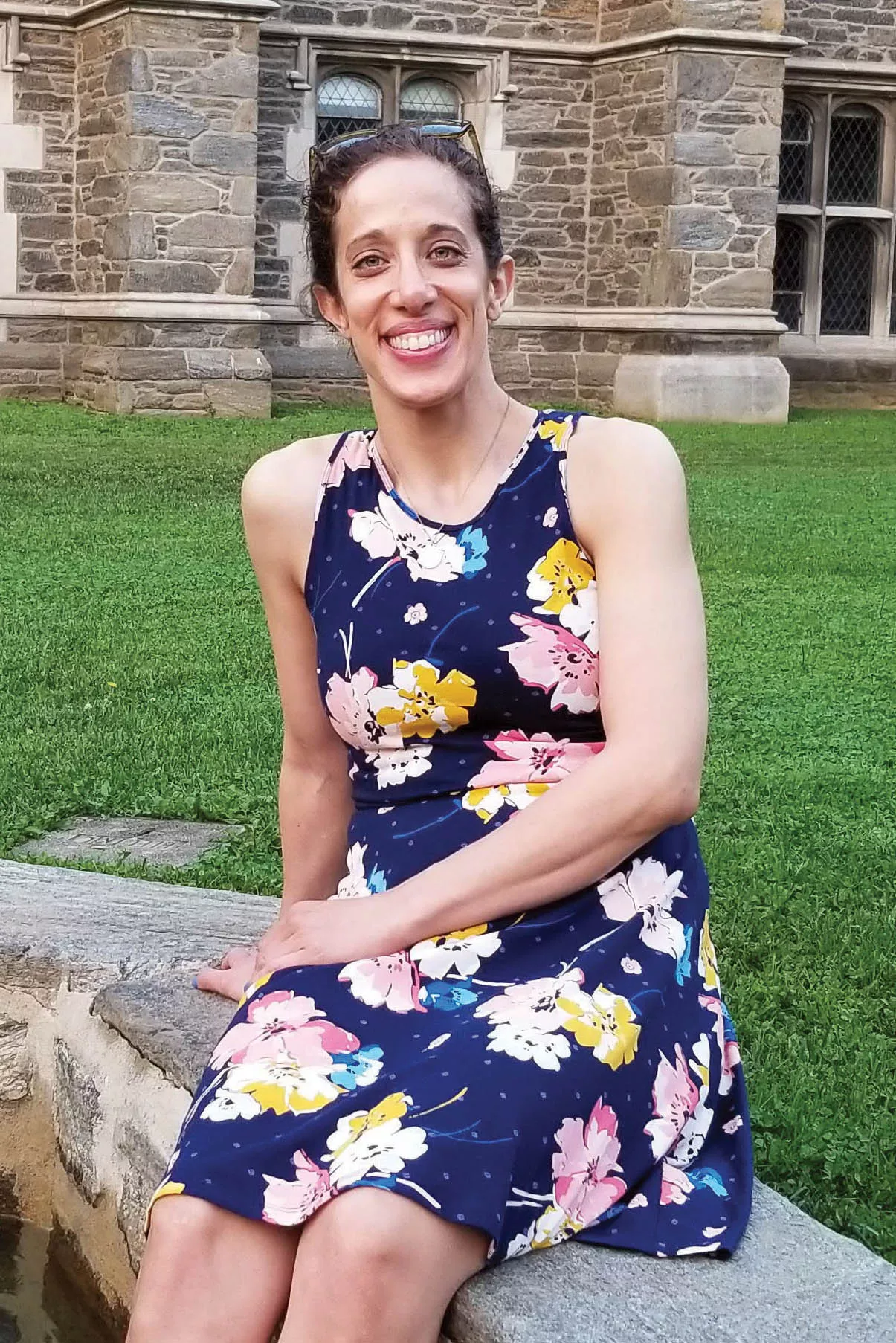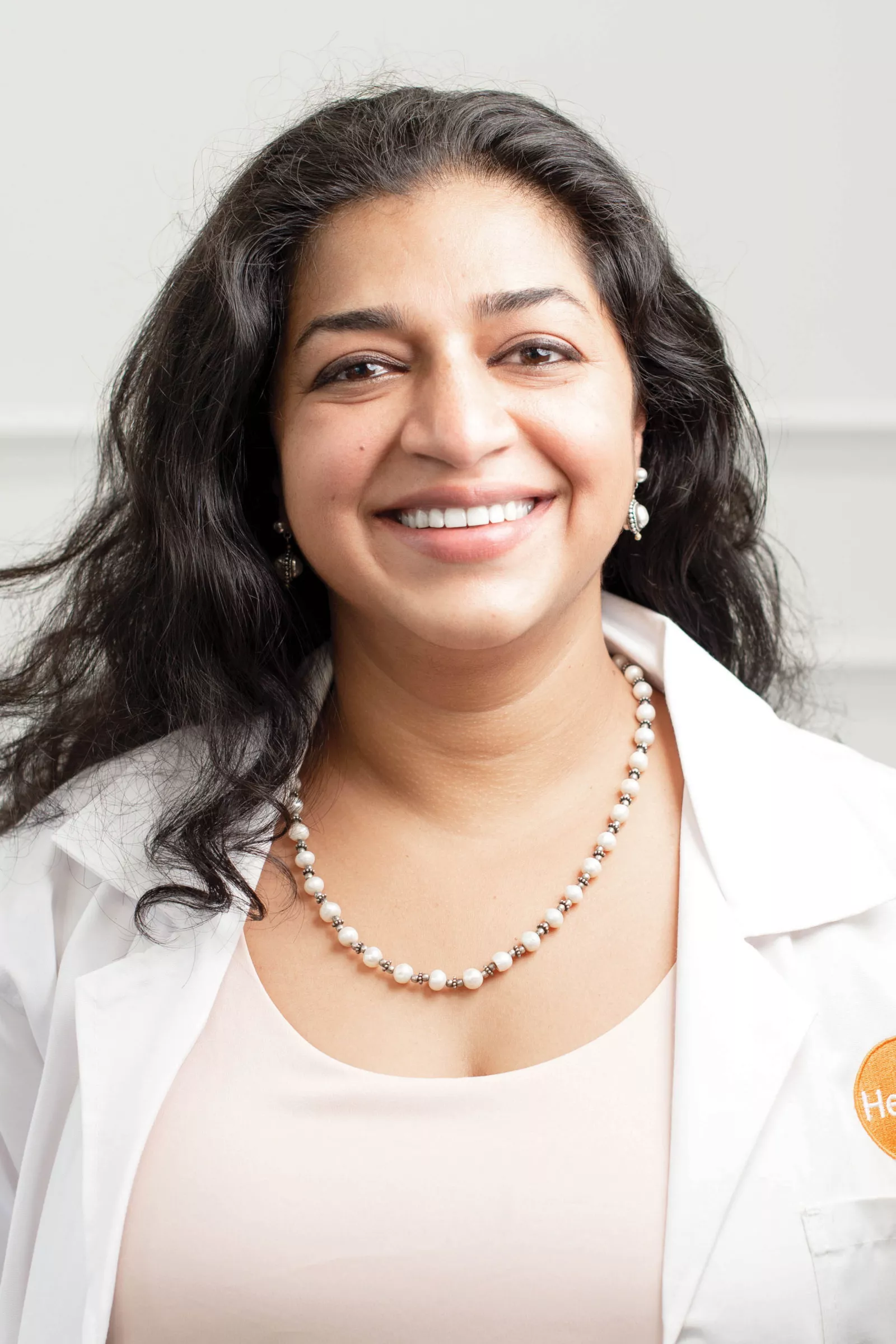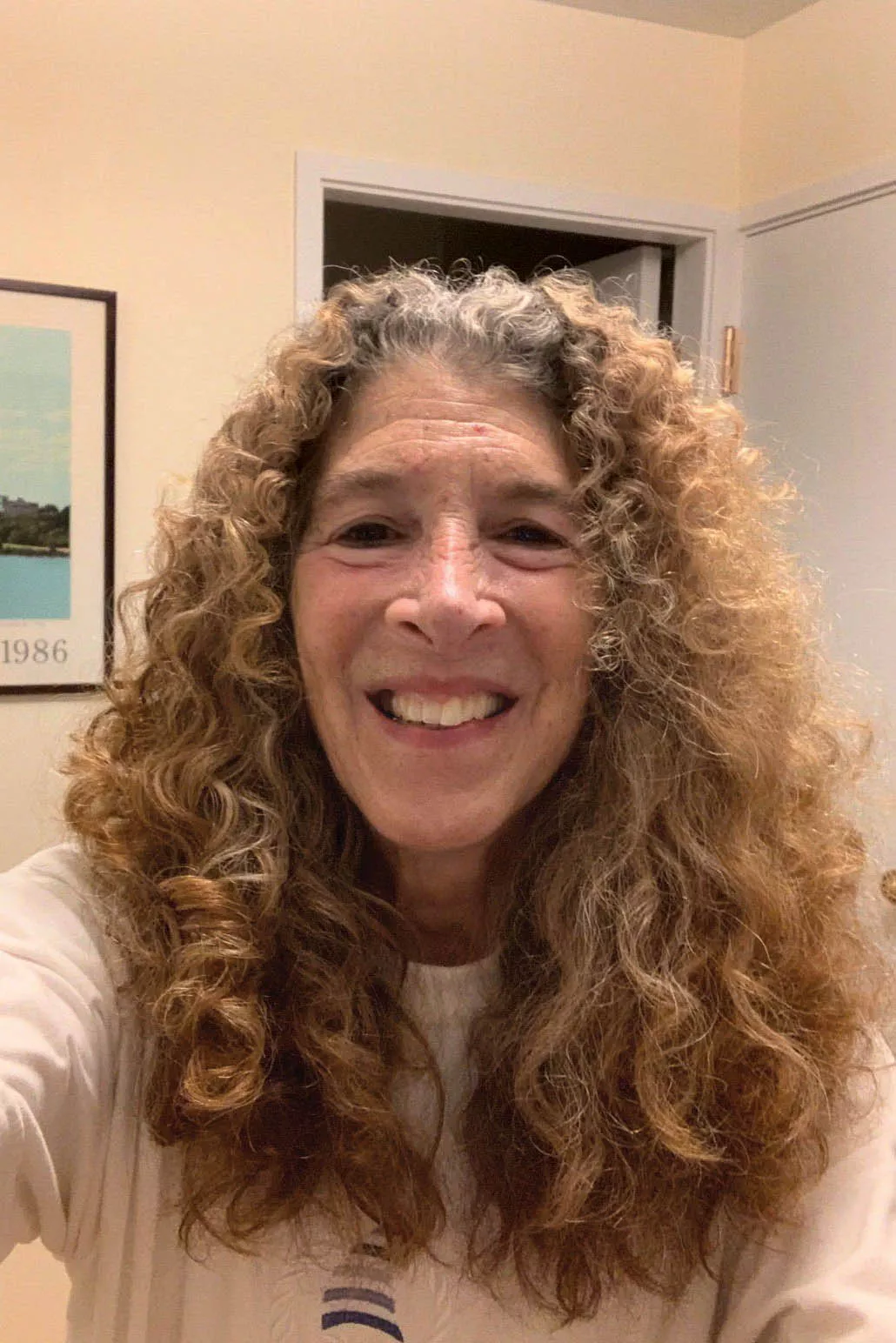Answering the Call
Nine Mawrters talk about how they found their life’s work in healthcare and how they maintain hope in challenging times.
From the age of nine, Deborah Smith ’74 knew she wanted to be a doctor. As her long and successful career as an obstetrician gynecologist attests, her early ambition was amply realized. Rhada Karnad ’03, who went to medical school in the United Kingdom and is now the chief medical officer for a healthcare provider in Nairobi, hails from a long line of passionate women doctors and midwives and never considered any other career.
That both of these women, and the half dozen others you will meet on these pages, chose Bryn Mawr College as their launching pad speaks to both the value of a liberal arts education and the rare combination of abilities needed to thrive in the field medicine.
“In health professions, practitioners need to be responsive, adaptable, flexible to changing situations,” says Gail Glicksman, assistant dean and health professions advisor for undergraduates and alumnae at Bryn Mawr. “They also need to be able to relate effectively, to listen, and to discern things about people from a broad range of backgrounds, identities, and intersections of identities. So, if they’ve been required to study some literature and some social sciences and they understand more about the workings of society they’ll have the tools to be more effective practitioners.”
Mawrters at any stage of their career can reach out to Glicksman for advice, and she welcomes those interactions. She also stresses the role Mawrters can play in helping other alumnae/i. “It could be a phone call or a Zoom meeting or speaking on a panel. But it could be really transformative for an undergrad.”
Recently, the Bulletin spoke with nine Bryn Mawr alumnae who have made their careers in healthcare, asking them how they got where they are, what their experience has been as women and minorities, how they have fared during the pandemic, and how they feel about the future.
The Obstetrician Gynecologist
Mzimeli Morris ’08, M.D.
Obstetrics and Gynecology Specialist, Montefiore Medical Center
The Bronx, New York
Bryn Mawr Major: Biology
When did you know you wanted to focus on OB/GYN?
When I was in medical school, I was trying to figure out what specialty made sense for me, and I was thinking pediatrics until I actually did pediatrics. And then I said, “I definitely can't do pediatrics.” It made me too emotional. I just got really attached to the kids. I loved the surgical subspecialties, and I considered trauma surgery because it's so exciting and I love being in the operating room. Then I did my OB rotation and it had both. I got some continuity of care with my patients, I got to be a part of caring for a whole family by taking care of moms, and I got to be in the operating room, so that was an amazing mix of both worlds.
How were you treated as a black woman in medical school and beyond?
I think in medical school everyone has some imposter syndrome, and the more of a minority group that you’re part of—if you're a woman, if you're Black—you get that even more. And it’s not just internal. People are placing that on you when you're on the wards and they’re asking you to take out their trash because you couldn't possibly be a medical student. That doesn't help you feel confident.
Having been at Bryn Mawr, in a space where I saw the possibilities of living outside of a norm and outside of a confine, allowed me to remember in those situations that you can push back, you can be loud, you can speak up, and everything will be okay, even if it feels hard.
How did your work life change in March of 2020?
It was insane. COVID has been crazy for everyone, but it was a special kind of crazy for us. Not only in New York City, but in the Bronx—we were the hardest hit borough. And I lived very close to two hospitals—the hospital I work at and the trauma center. There was a point where there were ambulances right by my window every 10 to 15 minutes. It was terrifying. And everyone was on lockdown, but we weren't because we had to go to work.
And even now it continues. It's not as scary. We're vaccinated and boosted, and I wear an N 95 every single day and so I feel protected, and my family is protected. Now it's just more of a frustration because there are so many people who have gotten misinformation and who don't understand the science and are non-vaccinated. It’s a constant battle, a constant debate. I will say it's improved with the mandates in the city because a lot of our patients work for the city or work for the state and so are being mandated to be vaccinated and boosted and that's made all the difference.
How have you taken care of yourself?
During the height of things, I cooked a lot. I would cook all day for the whole week, and for that day I couldn't think about COVID, I couldn't think about anything else. I just had to follow this recipe and just be here in the present.
What would you tell a young person wanting to be a doctor?
You’d better want to take care of people. You’d better want to work the rest of your life. Most doctors don't retire when they're 60. We're kind of hardcore. So, if this is not a passion for you, don't be a doctor. It's so much work and there are so many pieces other than the patient care that are so frustrating. If you can't find your joy in your patient interactions and have that be enough to pull you through the frustration, then it's just not a career for you.
How do you feel about the future? Do you feel optimistic?
Yes, I do feel optimistic. There are more and more women in medicine, especially in my field, and there are more and more underrepresented minorities in medicine. I also think that the health community is starting to understand that continuing with the status quo is not helping, because Black women are still dying four times more than white women and we've got to figure it out. There are a lot of people doing really good work and that we're collaborating more and more. So, I do feel optimistic.
The Family Doctor
Ann Smith ’81, M.D.
Primary Care Physician, VA Medical Center
Asheville, North Carolina
Bryn Mawr Major: Biology
You had a family practice near Pittsburgh for many years. What made you move away from that?
I really loved my practice. It was just the way I had envisioned I would one day hang up my shingle. What changed my practice was electronic medical records. I loved my handwritten paper charts, and I would hire a transcriptionist to type them up for me on one-sided sticky paper. It made me happy to give her employment, and she was part of our little family. I had a secretary, a nurse, and my transcriptionist, and my cleaning person who was my nurse's husband. It was just sweet. I tried not to have electronic medical records, but insurance companies would start reimbursing you less if you didn't have them.
So, I decided to join a small practice that already had electronic medical records. We moved to Asheville because the political climate in Southwestern Pennsylvania was just about intolerable for me, as were the winters. Asheville is a really neat place to live, but it was a very unhappy little medical practice. So, I stayed for five years, and then I joined the VA. I thought it would be too gigantic to enjoy. Now I realize that it's a community, and veterans love being there. It really is a band of brothers. Not so much of sisters. For the women, we struggle but we try hard, and I have wonderful colleagues.
When did you know you wanted to be a doctor?
When I was a little girl, actually, I wanted to be a nurse. We had a World Book Encyclopedia, and I would get out the N and look up nurses. I even looked up the armed services and realized that you could be a nurse in the Navy or the Army. I remember thinking, "I would like to be a nurse in the military and wear one of those neat uniforms, preferably Navy." My dad said to me, "Ann, I think you could be a doctor if you wanted to be a doctor. The nice thing about being a doctor is you can be your own boss."
So, by the time I went to Bryn Mawr, I knew I was going to be a doctor. I didn't tell anyone. I was scared of any kind of pressure or competition or somebody telling me what I had to do in order to go to med school because I wanted to do it my way. So, I did everything I needed to do. I thought I should major in a science. So, I majored in biology, which was my least favorite of all of my classes ever. But, I knew it was getting me where I wanted to go.
Have you felt accepted as a woman?
Generally, I've been super accepted. When I was in Pennsylvania, sometimes, my female patients’ husbands wouldn't want to come to me. And when they did, they would say, “I've never been to a lady doctor before, and I'm not sure I'm going to like it." And then, they always loved it. They would tell me later that they would never want to go back to a man doctor because they loved the care, the affection.
I became the chief of the medical staff at my little hospital in Pennsylvania. And that was quite an accomplishment. I was the first woman who had gotten that position. And I know that there was a little block of men who didn't want me to have the job. And there was one ballot that came in that said, "Anyone but Dr. Smith." But I still got the job.
How has the pandemic affected your work life?
The worst part for me was not seeing people in person. When I have somebody in the room, I can look at them and put my hand on their arm or touch a knee and squeeze it, and say, "It's going to be okay." I really missed that physical part of medicine.
We're able to see patients now because we've been immunized. So, things are beginning to get back to normal, though I'm still sitting on my rear end a lot at work.
How do you take care of yourself?
I've been taking Zoom guitar lessons and playing guitar for church on Sundays. I said to my guitar teacher, "I want to make my guitar music more interesting for my brothers and sisters in church. I don't want to just be strumming or doing the same pick pattern over and over.”
I also like to exercise, always with music. I can really let go in Zumba class, and shake it and move it. For a long time, I wouldn't look in the mirror because I just wanted to imagine that I looked fantastic. But sometimes, I will move out in front of the mirror, and it's like, "Damn, girl. You are still looking good." I also like to scream and yell and laugh out loud in Zumba class.
What has been most surprising to you over the last two years?
How angry I can be with people. We have such wonderful science that has given us the vaccine and now people want to ignore this beautiful gift that is being given to them. If it were just hurting them, I might be able to say, "Fine, do whatever you want. It's your body, your life. I'm giving you the best information I can. Do with it what you wish," which is what I've done for patients with obesity or diabetes out of control.
This situation is different. This time, when you make a decision, it has a ripple effect. This is our planet we're talking about. I have to find some happy medium, some place where I can continue to be a good doctor for people who don't agree with the science.
Would you encourage a young person to go into medicine?
If you have a passion to practice your love of fellow human beings, for humanity, in this very physical, intellectual, emotional way, if that is what you really want to do, then do it. Do it with love. Do it without reserve. And make sure that you have enough ferocity that you're going to be able to overcome the bumps in the road that will surely come.
The Medical Director
Deborah Smith ’74, M.D., M.P.H., FACOG
Medical Director, Blue Cross Blue Shield Association
Silver Spring, Maryland
Bryn Mawr Major: Sociology
How did you find your way to your profession?
From age 9, whenever people asked me what I wanted to be when I grew up, I said I wanted to be a doctor. From the time I entered college, I wanted to be an obstetrician gynecologist. And that was cemented for me in the late ‘60s and through the ‘70s. I still have an original copy of Our Bodies Ourselves.
After I finished med school at Howard University, I stayed there to do my residency training and took a year out to do a Master of Public Health at Cal Berkeley. After finishing my training in OB/GYN, I had opportunities to work on maternal and child health projects in Africa, at one point splitting time between a clinical faculty appointment at Howard and leading public health interventions in Malawi.
It ultimately became unrealistic for me to be traveling abroad four to six weeks at a time [Smith had married a South African epidemiologist and had two small children at this point], so I said, "Well, okay, charity begins at home." And there were all these things that I had learned about working in under resourced areas and with a multidisciplinary approach. So, I came back to Howard and started getting involved in a lot of community-based activities in the Washington metropolitan area. I’ve always stayed engaged in the macro issues around women's health, in addition to the direct provision of care.
How have you been treated as a woman in your career?
When I started in practice in 1983 probably 97% of all practicing obstetricians and gynecologists were men. Three percent were women, and an even smaller number were women of color. I had many of those experiences where patients would say, “When is the doctor coming? The doctor hasn't come to see me today.” The nurse would say, “No, don't you remember that Dr. Smith was here with her team.” And they would reply, “Oh, you mean the little lady doctor.” I became known as the little lady doctor. I was quite small and not what people were expecting.
How have you addressed equity issues in your own practice?
I had a very wide-ranging patient population in my practice. We had a kind of an underground clinic for women who identified as lesbians and literally came from all up and down the East Coast, because the word got out that, “She's okay. You can come and be yourself.” That led to my being referred transgender individuals. At one point it was reported that I was the first gynecologist in Washington, D.C., who knowingly accepted a referral of a woman with HIV-AIDS. Well of course, this is your oath, right? Why would I not?
I always thought that being involved with what I call listening behind closed doors was really very important too because you get the larger context for a woman's life. Always the push and pull for me was, what does this mean when I'm hearing this from this woman and then more like her. What does that mean for what should happen outside of the examination room?
What I’ve heard directly from patients has enabled me to speak on behalf of them and raise issues in more organized medicine settings. On committees I would often hear things being said that were sexist, racist, homophobic, classist. You name it. I learned to say—and this follows from Robert's Rules of Order—"I have an unreadiness.” It formally stops the proceeding and gives you a minute to get in your head and say, where am I going to go with this? Now I'm at an age and stage where I can be much more assertive and much more definitive.
You now work for Blue Cross Blue Shield. Tell us about that shift.
When things changed in South Africa, my husband was hired to start the first school of public health in Sub-Saharan Africa. Working as a consultant for the Blue Cross Blue Shield Association (BCBSA) was how I was able to backstop the fact that there was functionally only one income for the first couple of years that he was back in South Africa. I did it for 17 years, along with everything else. Then at a certain point, I went over to the “dark side” fulltime.
So, it's now been five or six years since I stopped doing any hands-on medicine. But I've been fully engaged in medical policy work. When COVID hit, we stood up the Pandemic Readiness Task Force for BCBSA. Every 1-2 weeks, since March of 2020, I have been part of a team that has done briefings for all of the internal people in the Association and clinicians, medical directors, nurses, staff, management people from all of the Blue plans.
When George Floyd was murdered, BCBSA declared that they were going to address themselves to equity issues. And of course, for us it's health equity. There's a component of our national health strategy for the next five years that is focused on maternal health. So, I've come full circle.
One of the areas I focus on is making sure that we create ways to bring to the table not only understanding of the historical narrative of health issues for women of color and Black women in the United States, but also the current voices of their experiences.
What do people entering the medical profession need to know?
You need to be called to do it. Because it's way too hard. And you can't stay good at it if you're not continuously re-imagining it, learning about it, challenging what you know. When I started in med school, immunology and genetics—which we now understand explain the entire world—were rudimentary. I couldn't possibly stay with the knowledge base that existed between 1974 and 1978.
The Public Health Worker
Judith Weinstein '85, M.A., M.P.H.
Area Coordinator, CDC Foundation COVID-19 Vaccine and Public Health Workforce Project
Chicago
Bryn Mawr Major: French
Can you briefly describe your work?
I supervise a team of 10 regional coordinators who oversee over 600 field employees who are recruiting, hiring, and supervising a diverse group of public health workers (contact tracers, vaccine program managers, epidemiologists, IT project managers, etc.) in the Midwest, as well as New York, New Jersey, Puerto Rico and USVI. I joined the CDC Foundation in May 2020 when we were still "building the plane while flying it." We are continuing to write the playbook during this unprecedented moment in our history. (Well, there has been a precedent, and that was 100 years ago.)
How did you find your way to your profession?
After completing my master's in French studies, I moved to Baltimore to join my fiancé who was in medical training. I had vague plans to do something international. With my fluency in French and typing skills I joined Jhpiego, an international reproductive health training program based at Johns Hopkins University. My title was "Bi-lingual Secretary for Africa." I realized that the next logical step for me would be to get a Master of Public Health degree. For much of my career I was able to dovetail my French language skills with my work in public health. Prior to joining the CDC Foundation, for example, I worked with refugees and asylum seekers rebuilding their lives in Chicago.
Did your time at Bryn Mawr influence your career path?
My time at Bryn Mawr shaped me to be a confident, critical thinker who believed there were no obstacles to pursuing any career or position. It was also a place where I made deep and lasting friendships, my chosen sisters, who have been my squad throughout every chapter of my life. I believe strongly in the old girl network and, trust me, if I see Bryn Mawr on someone's resume (or another women's college), I am going to give them a second look.
How did the pandemic shake up your work life?
Hah! The pandemic is my work life. When the pandemic hit, I decided I was going to volunteer as a contact tracer or for whatever was needed. A friend told me about the CDC Foundation's COVID-19 surge staffing initiative and I’ve been working non-stop ever since. I got the job I feel my entire public health training and experience has prepared me for, just when I thought I'd never work again due to ageism.
Can you tell me about one moment that stood out?
I was in Europe and North Africa in February 2020 when there were signs that something was amiss in the world. My daughter had been working in fashion in Paris and saw things before we did—the hiring freeze, the import of PPE. On a Sunday in March, she phoned me (I was back in Chicago) to say that she had been to the Luxembourg Gardens and could not see the grass, there were so many people back-to-back. And she had heard from a source at the Embassy that Paris was going to go into a true quarantine that Tuesday. I called a friend who works at the State Department who looked at her watch and said, “Hm, all the flights have left today; I'd get her home tomorrow.” I called Abi back and said, "I can get you on a flight tomorrow."
What keeps you up at night?
Everything! Worrying about my staff and their mental health. The collective mental health. Climate change.
How have you taken care of yourself?
It's been hard. I sit in a chair 8-12 hours a day. I practice yoga. I wish I liked meditating. I make the time and space for my team—my work family—to talk about things other than COVID. Sometimes we cry together. We have to.
How do you feel about the future?
I feel positive because I think this generation is very smart and very inspiring. I really love this generation. Even though they hate mine.
The Pediatrician
Leslie Sude '84, M.D.
Pediatrician, Yale University Hospital
New Haven, Connecticut
Bryn Mawr Major: Religion
Why were you drawn to pediatrics?
I saw working with children who had a long trajectory of life and opportunities for determining their future health and social emotional wellbeing very impactful and meaningful. To get in on the ground floor, if you will, to work with a child from birth and see them through their launch into adulthood was very appealing.
How has the pandemic affected your work?
Well, it's actually energized my professional life, because there's just been more to do. More community needs, more family needs. Promoting wellness through the pandemic has presented new intellectual and physical challenges, but it's also presented extraordinary new opportunities to work with our communities as full partners in delivering healthcare. And I have found that to be very exciting and very rewarding.
Tell me about those opportunities
Because of the pandemic, I started a mobile health service that sees newborn babies and postpartum moms together in the community right after discharge from the hospital. I also led a task force to provide mobile flu vaccines in our community, which we’ve used as a training exercise to ultimately provide mobile COVID vaccination clinics.
I've also been working to address childhood poverty by providing free financial services—anything from tax preparation to debt relief coaching—to the families at our clinic. Traditionally if somebody's having economic problems, we would refer them to the food bank or the housing authority. Why not provide a prescription, if you will, for improving the financial health of the family, the way we would prescribe exercise or a healthy diet.
I've also done quite a bit of work with a local nature wellness committee through Yale University, where we're trying to look at ways to increase mental wellness, as well as physical wellness, through experiences in nature. There's actually a movement across the country in various forms to provide more prescribed experiences in nature. And there's actually good data to support that these experiences improve mental health, as well as physical health. With the pandemic that's been somewhat challenging as people have been somewhat reluctant to spend time outdoors. But it is something that I'm a passionate advocate for, getting my patients outside in nature.
What has surprised you over the last two years?
The first time that somebody said no, that they did not want a vaccine that was prepared and ready to go and didn't trust it, and didn't trust us was a stark reminder that, just because we had a good idea and, and a scientific plan for going about how to address the extraordinary, the devastating impact the pandemic was having on us that still, that people wouldn't necessarily come around so easily.
There have been so many days when I walk out of a clinical encounter, angry, defeated. But I'm more angry not so much at an individual but at the systems that facilitate the misinformation, the social media, the cult, the pushing through politics and culture, the resistance and pushback against public health.
Do you feel optimistic about the future?
Right now, one year after an insurrection on our capital and the continued divisiveness in the legislature, I can't say I feel terribly optimistic. I'm lucky to live in the state I do live in. Connecticut has rolled out some remarkably progressive social programs in the past two years to support families during the pandemic.
Would you encourage a young person to follow in your path?
Yes. Because the need for compassionate, passionate, and intelligent healthcare providers will never go away. I think current undergrads tend to see the world through a lens of social justice and economic justice and racial equity. And all of these things can be addressed through healthcare services.
The Social Worker
Olga Montgomery, M.S.S. ’20
Palliative Medicine Social Worker
Richmond, Virginia
Bryn Mawr Degree: Clinical Social Work
Can you describe your work?
I work in end-of-life care with people impacted by chronic, complex, or life-limiting illness as a medical social worker and as a therapist in private practice. My clients include patients as well as caregivers, family, and loved ones.
How has the pandemic affected your work?
The pandemic has substantially impacted my work. Many visits which would have been in-person are now telehealth, which comes with changes in the therapeutic process—some difficult, some welcome. When in-person is required, nonverbal indicators of compassion are stilted because of distancing and personal protective equipment. There’s also a substantial increase in anxiety and worry during the pandemic—though concern has always motivated precautions taken to protect immunocompromised people, the intensity and impact of fear is now heightened tremendously.
Is there a memory that stands out for you from the past two years?
I met a family at a skilled nursing facility. We took nasal swab tests to enter the building, checked temperatures, wore masks and face shields. Because of these precautions the patient, his brother, his cousin, and I could meet in the same room. We were lucky just to have a family meeting! My face shield was foggy, and I was sweating as the family shared gut-wrenching fears about hospice, tearful reflection on recent losses, and very palpable grief. I wondered if I looked like an unfriendly space-suited alien to the patient who was drifting in and out of awareness. I felt that I had difficulty connecting therapeutically—I couldn’t even soften my voice because I wouldn't be comprehensible through the gear. But somehow… the therapeutic connection was made and the process continues, now over the phone. Both the difficulty and the resiliency of this encounter stand out to me.
What is something you have learned?
I graduated from the GSSWSR in 2020 and much of my graduate training and education was contextually based in a different medical landscape. I had to adjust, so, I took to the internet. While expanding my therapeutic skill set in this “new reality” I had to practice, and fumble. Yikes! I think the only way I could tolerate it all was to learn to give myself a little more grace.
What keeps you up at night?
Nothing—I am as vigilant as possible about sleep hygiene. I know the question is more about what worries me, and a lot of things do, but I can’t impact most of those things whereas I can impact my own wellbeing for the better or the worse.
How have you taken care of yourself?
Imperfectly. I try to sleep well, drink enough water, eat nutritious foods, and exercise. I spend quality time with my husband. I connect with friends daily. I try to notice small, still, sweet moments with my animal companions. I consciously remember my values, what matters to me, why I chose a career in end-of-life care. I strive for insight to differentiate what’s mine to control and what’s mine to let go of—the main way I take care of myself is to do what I can, but not more.
How do you feel about the future?
In the grand scheme, I remain optimistic about human ingenuity. I do worry about cataclysmic events—but it’s not workable for me to live in worry. It gets in the way of my effectiveness as a clinician, presence for my loved ones, and care for myself. So, I choose to keep my eyes open but also to keep my feet moving towards what matters, and I aspire to contribute meaningfully to that human ingenuity I am optimistic about.
The Nurse Practitioner
Marissa Patterson ’08, C.R.N.P.
Family Nurse Practitioner
Philadelphia
Bryn Mawr Major: Biology
Did you know that you wanted to work in the medical field when you were a student?
Yes. I was going to be a doctor. So I went through college, took the MCAT, took a year off and did AmeriCorps and then applied to med school. In my interviews, I would talk about how I wanted to do holistic care. And they would say, “Oh, that's really hard to do as a doctor.” But I was seeing it being done by the nurse practitioners at the health center where I was working at the time through AmeriCorps. So, I put a lot of thought into it and decided I wanted to be a nurse practitioner instead.
What character traits are vital in your work?
A lot of patience, a lot of understanding that your priorities aren’t always the same as those of the person who's sitting there in front of you. You have to find a balance between listening to what they want to focus on and trying to connect it to the other things that are happening in their lives. So, you might say, “Okay, but your diabetes is still really important for us to talk about today, and here's why.”
Was it hard during the pandemic to get used to virtual visits?
No, I actually really like doing virtual visits. I mean, there are definitely challenges to them, but it's kind of nice to see patients in their space. You get a sense of what's going on in their lives. You see their kids in the background, their pictures. So, I think in some ways it's allowed me to develop better relationships with my patients because you get that glimpse of what their life looks like.
What has surprised you most?
The second year of the pandemic I got pregnant. And so, I was being much more cautious, and it was surprising to me when patients would come in and say, “Well, why are you still wearing a mask?” And this was right around the time people were starting to get vaccinated. I was like, “We're still in this, this is still going on.”
And that's been an interesting lesson for me in being firm about what's important to you and what works for you. Just finding your own place of comfort and your own boundaries, which I think is important in a lot of ways in healthcare.
How do you feel about the future?
I feel optimistic. I also feel uncertain, I feel worried that a lot of the things that we've learned are going to go out the window. There's a part of me that would actually really like it if people kept wearing masks, especially when they’re sick. Even if you have the flu or a stomach bug and it's not COVID there are still people you can put at risk. And so, I would hope that people continue to take that knowledge with them moving forward. And I expect that they will not.
How did your time at Bryn Mawr influence your career path?
I think the best way that Bryn Mawr influenced me is that it helped me remember that having the most money or the most prestige is not always the way that you want to live your life. I got to know a lot of people who weren't seeking those kinds of careers. Whereas if I had been in another institution where people around me were much more focused on making the most money and having the best sounding career, I would've maybe gone in a very different direction.
The Chief Medical Officer
Radha Karnad ’03, B.M., M.P.H.
Chief Medical Officer, HealthX Africa
Nairobi, Africa
Bryn Mawr Major: Biology and Anthropology
Can you describe your work?
I am the chief medical officer at HealthX Africa, a primary health care service provider seeking to making quality care accessible and affordable for every single Kenyan through the power of passionate and driven providers, digital technologies and telemedicine, and carefully curated partnerships for health.
While I am a bit of a jack-of-all-trades at the moment (apparently normal in a newly fledged organization!), officially my role is to oversee the clinical quality of our operations, and that every patient (irrespective of any factor on the basis of which they may normally be discriminated against: age, gender, geographic location, economic bracket) consistently receives our expected standard of care. In reality, my role shifts nearly hourly between strategic planning, marketing and communications, partnership building, and HR.
How did you find your way to your profession?
I come from a long line of strong women who are all passionate doctors and midwives, and in my own mind (despite discouragement from those same women!) I was always set on being a doctor. After Bryn Mawr, I moved to the UK for medical school sure I would become an Ob/Gyn in the UK National Health Service. While I absolutely loved clinical practice, I was frustrated by how badly healthcare services are managed and how inequitable healthcare services are globally. Despite its flaws, the NHS served anyone and I never once had to consider whether a patient was able to pay when I provided their care, yet in the US and in India and Kenya, where I had family, services (and quality!) were highly dependent on one's knowledge and one's willingness and ability to pay.
I took a year out of my training to do a Master of Public Health, got pregnant, and moved to Kenya with my husband and newborn to put into action all I was learning (and be closer to family). I ended up at Jhpiego, as the lead for their global primary health care portfolio. After five years I felt myself moving away from where the work actually gets done. I was writing 50–60-page strategy documents that were circulated to the WHO, speaking at global events, and seeing no real change to healthcare or health service access in Kenya or East Africa. When HealthX presented itself to me, it was too tempting an opportunity not to take up.
Did your time at Bryn Mawr influence your career path?
100%! The overall culture and values of Bryn Mawr—the honor code, gender equity, diversity, independence—played an enormous role in shaping the woman I became in my four years at BMC. In both Bio and Anthro I took as many courses as I could on health care, public health, health equity etc.—across the TriCo and at Penn. Many of my closest friends were (and continue to be) similarly motivated women looking for careers in the health space, and we encouraged and pushed each other to succeed. Bryn Mawr helped me find volunteer positions providing respite care for families affected with HIV, internships working at the Children's Hospital of Philadelphia and the AIDS Institute (NY State Dept of Health), and awards/ stipends to pursue research into healthcare decision making and gender for my senior thesis. I didn't see those pieces fitting together then, it all felt disparate and fortuitous, but I look back now and see clearly how they shaped not just my career path but my career objectives and my motivations.
Tell us about a moment during this “new reality” that stands out?
The work we are doing at HealthX is really quite revolutionary for East Africa. My 7-year-old son recently spiked a high fever and felt unwell. I called HealthX and spoke to one of our doctors who recommended a COVID test and some blood tests. I called our partner lab, who were at my house within an hour to do the tests. I received my results by email within two hours (he was positive). I WhatsApp'd our partner pharmacy, and had medication delivered to our home. I paid for it all using mobile money and submitted my insurance claims over email. I was reimbursed using mobile money. I had had the most efficient clinical experience, all from my comfort of my home, without having to leave or move my sick (and infectious) son. These services would have taken me half a day or more of driving around the chaos that is Nairobi. This was one in a series of moments of realization that what we are doing at HealthX works, it serves a very real need, and it can truly make healthcare easier to navigate, more personal, and more pleasant for users.
How do you feel about the future?
The extent of uncertainty in these past few years, the ruined plans, the last-minute changes in regulation, the separation from friends and family has left me feeling more cautious about making (and getting excited about) plans. But sitting here right now, with the sun shining down over green Nairobi, my kids back in school and healthy, some exciting opportunities and partnerships at work, I do admit to feeling a glimmer of optimism and excitement for what is to come in healthcare in Kenya, and what my role gets to be in shaping it.
The Psychiatrist
Margaret Ross ’70
Medical Director, Center for Anxiety and Related Disorders at Boston University
Boston
Bryn Mawr Major: Biology
Tell me the highlights of your career.
I worked for 23 years at MIT as a psychiatrist. Later, I was director of Boston University Student Mental Health. There are 31,000 students at BU and I had 16 staff. It was a very intense job, but I loved it. Boston University is a city unto itself, and anything that happens in a city can happen at BU. I very much enjoyed being responsible for the students and also caring for the staff. I helped to set up a safety net at the University that included many disparate offices. My quote in my Bryn Mawr yearbook was from The Catcher in the Rye. "What I have to do, I have to catch everybody if they start to go over the cliff... That's all I'd do all day."
After my years as director of behavioral medicine, I transitioned to being medical director at the Center for Anxiety and Related Disorders and learned how to do a different kind of therapy, cognitive behavioral therapy. And then I also have my private practice and consult to Mass College of Pharmacy and Health Sciences.
What drew you to psychiatry?
Mental health and mental illness were very much part of my universe when I was an adolescent and young adult. My parents believed in the power of psychotherapy to help, and my family benefited greatly from mental health professionals. In the 1970's, people were becoming more interested in the workings of the mind, beginning to really understand the central importance of mental health and wellbeing.
When I entered medical school, I was excited to learn about the different specialties, and had not made up my mind definitively, but psychiatry was always near the top choice. The more I learned about it, the more I was drawn to it. I loved pediatrics as well, and I have always been glad that I did two full years of training in pediatrics after medical school in that it has made me a better doctor. But when, in the last month of medical school, I did a rotation in child psychiatry, I came home to my husband, David, and said, ‘I can't believe people get paid to do this! It doesn't even feel like work... I would love to be able to do this.’ And so, I applied for training in psychiatry to begin after the two years in pediatrics and have had not a moment of regret. It is a true gift of trust that people share their lives with me, and I try to help in every way I can. I love being a part of their lives, and since no two people or their issues are alike, I feel constantly challenged and neither bored or burned out.
Much of the tragedy and heartache in our world can be attributed to mental illness, major or minor, and being able to address these issues has made my life feel meaningful and valued. I don't always separate what is my "life" from what is my "work"; it feels integrated. I have been fortunate to have a wonderful family, and they have, for the most part, put up with my devotion to my profession. It has felt like a true calling to me.
Have you noticed a heightening of anxiety during the pandemic?
Yes, for sure, there is more anxiety in the world now than there was when I started in psychiatry. The statistics show that there is, on balance, more anxiety across the age demographics, and less diagnosed depression. There can be a seesaw between the two, although certainly some people feel both. There have always been reasons for anxiety, for sure, but people are expressing it more now and sometimes it is said that we live in an "Age of Anxiety." For young people, social media has caused a good deal of devastation.
COVID heightened anxiety not only about health, but about how to cope with the added burdens of working with young children at home, financial reversals, not being able to socialize or date or be together with family members, heated political divisions about vaccines and mask-wearing, the uncovering of deep rifts in our political system, and inequalities in wealth and access to care that became even more evident. Climate change, a true cataclysmic emergency, is an ever-present source of anxiety.
There are other macro causes, and, always, the more personal causes of anxiety remain. Mental health professionals can do a great deal of good, with many forms of therapy and sometimes medication. I always go over the most important aspects of self-care with my patients, and this provides the infrastructure for treatment of anxiety. We review these points in almost every session.
Do you feel optimistic about the future?
I am by nature a very optimistic person, and this has always helped me. People ask if it doesn't get me down to speak with people with mental health issues, and I have to say that it doesn't because in most situations, I feel that I can offer something to them. It is hard work, but it is always intensely rewarding, and so moving that it sometimes brings me literally to tears. I have the same concerns about our world that my patients do, and I am glad that there are people working on all of those crucially important issues. For me, I feel I am doing what I do best, and feel hopeful that I will be able to continue this work into the future.
Published on: 05/26/2022
